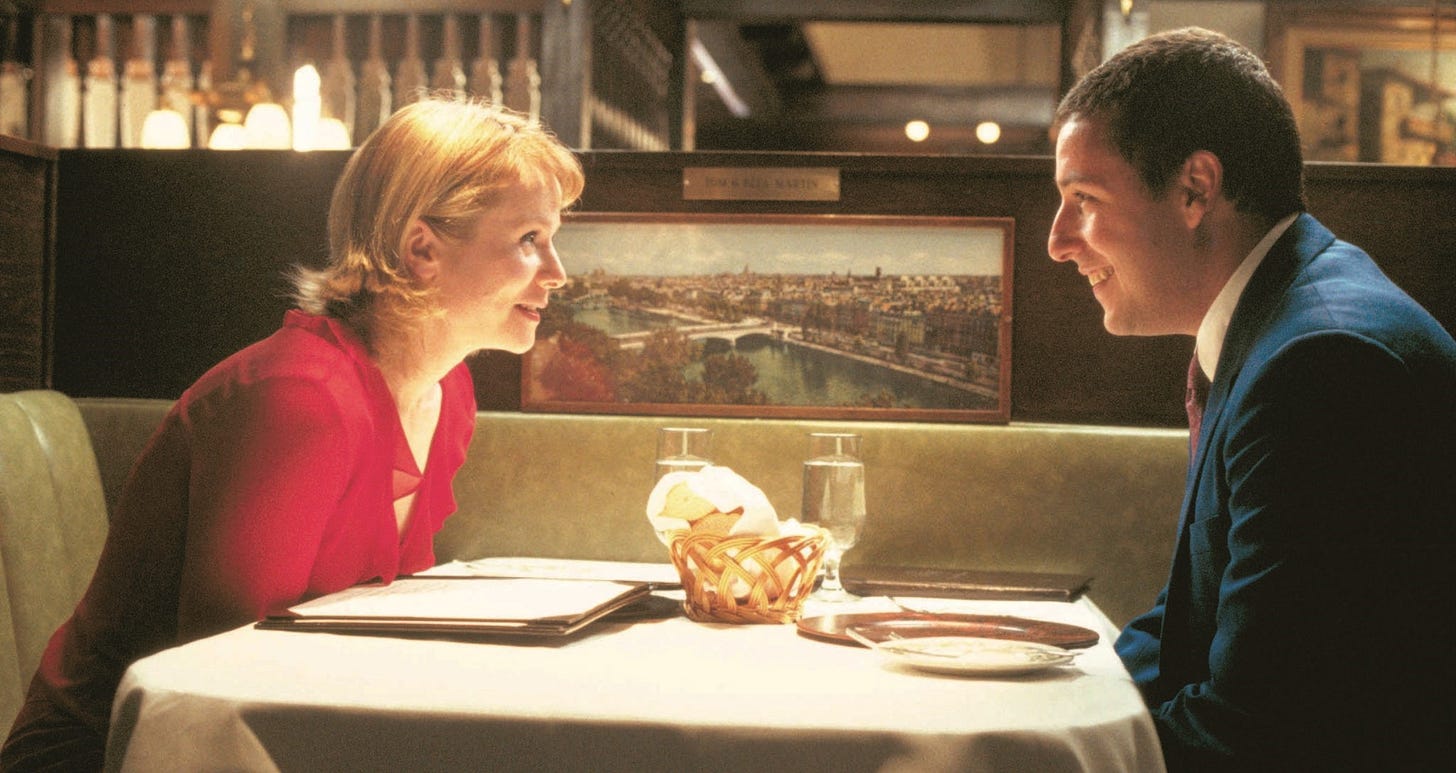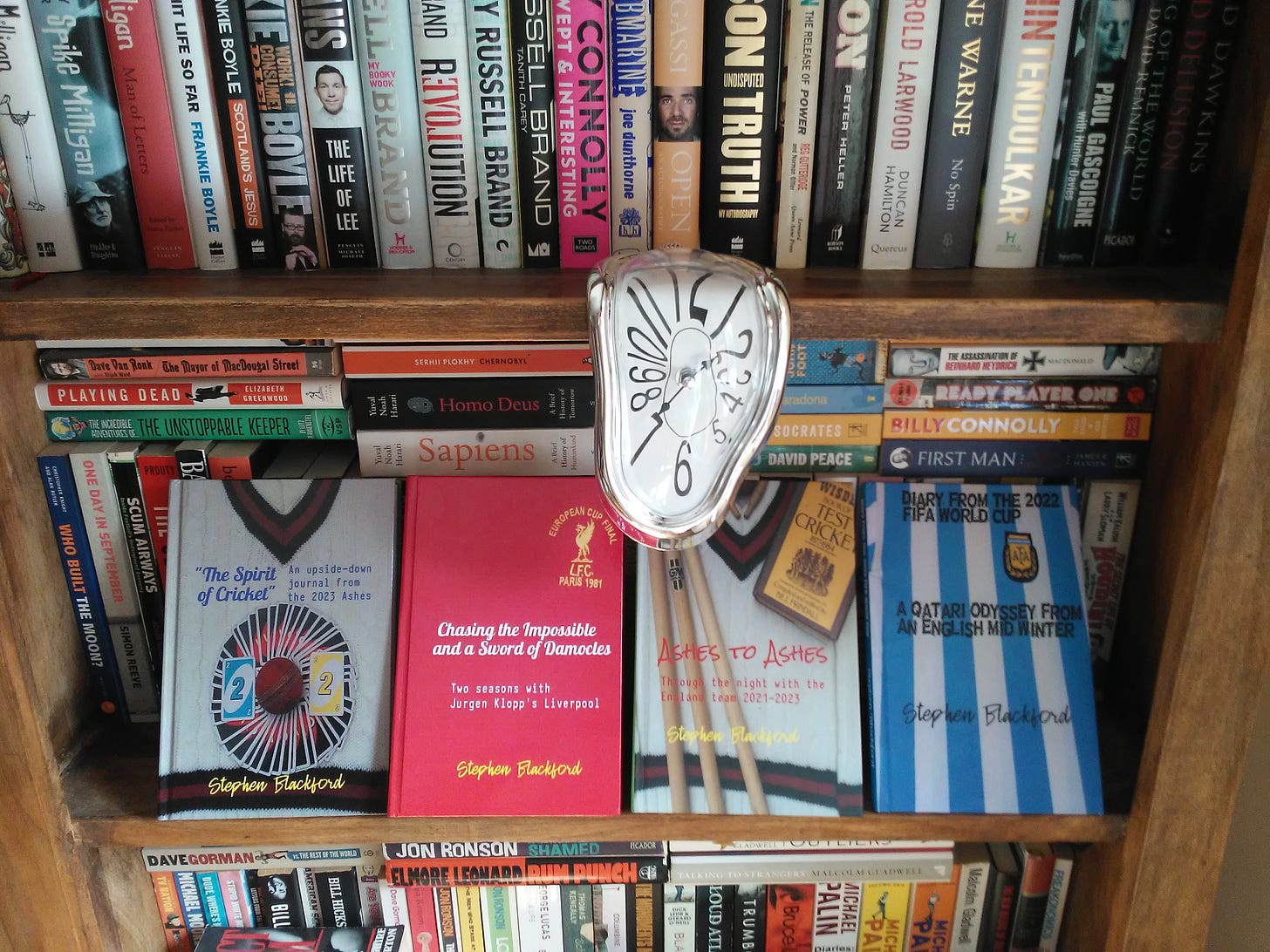“Punch-Drunk Love” (2002) — Read Along
“I want you to know that I wanted to kiss you just then”.

I posited in my recent Pulitzer Prize winning review of “Spaceman” that Adam Sandler is far better and dare I say a damn fine actor when playing more “serious” dramatic roles rather than the comedic turns that have propelled him into the Hollywood stratosphere, and I cited his performance here as a melancholic hen pecked dreamer in my argument. I realise I’m splitting my audience in two once more (Audience? Social Affairs Editor) but I’m a wistful dreamer like Barry Egan, and I know I’m not the only one. I dream of being younger of course and I dream of the day that my scrambled mind finally relents and stops my fingers dancing written webs all through The Matrix and an electrical paradise so bountiful in its harvest that there are people young and old, those dastardly handsome renegades in their 20’s, the prime of lives 30 somethings through to the oldest and grandest among us, who haven’t seen Paul Thomas Anderson’s “Punch Drunk Love” and for that I envy you, and for the very first time you watch this heart breaking masterpiece.
In a break both from tradition and the format of my “Read Along” series of articles on some of my favourite films from yesteryear I’ve reproduced the entire spoiler free review I penned over a decade ago as it’s a favourite piece of my older writing, and I’m in charge here and I thank you for stopping by on your electrical and universal journey. A journey through life that I hope for you is full of love and not electrical love here but real human love in that damned upside down “real world”. As the title of his masterpiece would suggest, this is Paul Thomas Anderson’s beautifully twisted tale of love and so much more, a little of which and no more than a taste is hopefully conveyed in my love-in appraisal of a much, much loved film.
“Read Along” needs a video, a choice of which is linked beneath a cavalcade of written delights and an old man showing off. The video here is one of my better ones but please don’t get excited! It may be Saturday night but please keep your decorum and blood pressure under control. It’s just me sitting like a Buddha in a strange pair of glasses beneath swans reflecting elephants, and elephants reflecting swans. Just me reading my own review aloud and kind of direct to camera. It’s more than a little “dry” but it’s me, the curator of the words you’re reading now. Over to you: Delve into the absurd “read along” concept if you wish, read a spoiler free article or three, watch a video or two, or dance merrily along to your next destination in our electrical spider’s web.
For all the lovers.
I hope you give and receive in abundance.
Paul Thomas Anderson’s fourth cinematic masterpiece is an underrated piece of pure joy. Here’s a dissection of the bizarre opening ten minutes that will tell you so little about the film you’ll simply have to watch it for yourself.
With no opening credits whatsoever the film opens on a long shot of “Barry Egan” (Adam Sandler) clad in a blue suit sitting at an office desk in an empty, barely furnished office in an industrial estate. The long shot frames Barry in the corner of the bare room, with a distinctive partial blue nominal strip of paint breaking up the otherwise staid, neutral coloured wall. In the middle of a telephone call, Barry is pedantic about a coupon offer, frustrated and apathetic at the responses received, he exits the office into a very early morning stillness.
Staring at the exit gate of the industrial estate, the camera pans away from Barry and continues to move, slowly swooping (a familiar pattern throughout the film) out of the gates and into a deserted, still and quiet road. It’s interesting to note both the pale blue “hue” that surrounds Barry and the complete lack of any sound as he approaches the exit gates until a passing car overturns unexpectedly and spectacularly, breaking the complete silence, as does a delivery van that swiftly drops off a piano at the kerbside and drives off.
Cutting back to Barry, now seated again and in the middle of another frustrating telephone call, this is quickly cut away from as Barry repeats his earlier leaving of the office, however this time a car pulls into the estate and he’s greeted by “Lena Leonard” (Emily Watson) with an odd request: “Is it ok if I leave my car with you?”. An awkward conversation ensues to which Barry accepts to help Lena and she leaves to go to work but not before the two share brief glances at each other. Barry appears stressed by either the conversation or the odd request (or both) and hides in the corner of his office, with the camera panning to him sneaking a look at the exit gates and the piano that is still sitting at the kerbside.
Again in complete silence, Barry approaches the piano, but with a swift change in camera to the opposite side of the road we see and hear a roaring truck approach, seemingly on a collision course with the piano. Back to the original camera angle, we see Barry now cradling the piano and rushing back to the office. Playing some gentle, indistinct notes on the piano, barely audible, the silence returns somewhat before the crashing sound of the roller blinds introduce us to “Lance” (Luis Guzman) in yet another PT Anderson film. Cue further awkward conversations between Barry and Lance, with Barry backing away and out of the office as a multi coloured stream of effects fill the screen to end the opening ten minutes.
In addition to Adam Sandler, Emily Watson and the returning Luis Guzman, Philip Seymour Hoffman also returns to a PT Anderson film, this time as an owner of a bedding store in a flat out bizarrely brilliant role as “Dean Trumbell”. And Barry has seven nagging sisters! “Elizabeth” (Mary Lynn Rajskub), “Susan” (Lisa Spector), “Nicole” (Nicole Gerbard), “Gilda” (Mia Weinberg), “Anna” (Karen Hermelin), “Kathleen” (Julie Hermelin) and “Rhonda” (Hazel Mailloux). And he has five Brothers in Law, one called “Walter the Dentist” (Robert Smigel).
Confused?
Here’s the two stars of this wonderful film:
“Barry Egan” (Adam Sandler) Simply never better and a career defining performance. Desperate for love, escape and normalcy away from his hen pecking sisters, Sandler plays borderline psychotic Egan in a brilliant portrayal. Nervous, twitchy and out of control, Sandler is brilliant and far funnier playing dead pan serious than anything in his “funny” roles. A sublime performance of nervous tension, chaotic mood swings and nuanced touches of real perfection.
“Lena Leonard” (Emily Watson) Smiling, flirtatious and eyes that shine and light up the screen. Desperate to secure a date with Barry despite his frailties and oddities. The smaller of the two headline roles, but Watson is superb throughout.
The greatest compliment I can pay this film is that it is a complete one off.
A quirky love story with a bizarre central narrative surrounded in bizarre and surreal sub plots that will make you laugh hard, even at the most surreal of circumstances. The central love story is a delight and a joy, with characters that are eminently likeable despite their foibles. Plot spoilers prevent me from disclosing any further than simply stating there are so many humorous (some very darkly comedic) scenes that will make you smile, especially the “Gay Boy” interlude, the restaurant restroom and the most joyous of all scenes, the iconic silhouette kiss from the film posters. A common theme in the film separate from previous PT Anderson films seems to be of being busy, distracted, looking elsewhere, of life going on without you and you looking at it from the periphery. There are many segments depicting this, and of moments of silence broken, often in the most unexpected of ways.
Brilliantly captured by Paul Thomas Anderson and regular Director of Photography collaborator Robert Elswit, the real kudos here belongs to Jon Brion for his musical score. In keeping with the film, it’s quirky and full of strangely colliding odd sound effects (especially when Barry is alone) and joyously uplifting when together with Lena. One music track stands out “He Needs Me” by Shelley Duvall. Jeremy Blake also deserves great credit for the bizarre, acid trip like feel to the multi coloured interludes.
Written and Directed by Paul Thomas Anderson, common themes of human separation, desire, a need for human interaction and compassion are all again to the fore amidst a chaotic mix of a dysfunctional family and hilarious central narratives.
Your heart is guaranteed to swell by the end of this beauty of a film.
“Punch Drunk Love" (2002) - Original Review
Paul Thomas Anderson — An appreciation
"The Essential Film Reviews Collection" Vol.7
My Youtube channel reading of "Punch Drunk Love"
My Rumble channel reading of "Punch Drunk Love"
Thanks for reading. If you like the premise of this absurd idea of “Read Along”, then you might also enjoy:
“Requiem for a Dream” (2000) — Read Along
“I Don’t Feel At Home In This World Anymore” (2017) — Read Along





